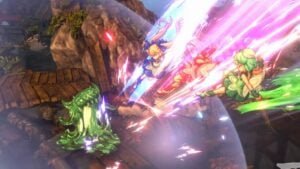The 90’s was a magical time in game design. Arcades were packed with kids whose pockets were weighed down by countless quarters; and gaming was finding its way. This was the age of Midway, the time where games like Mortal Kombat, and NBA Jam found a massive audience with young and old alike. It was also the time of rock star game designers that made up the rules as they went along.
This was a time that was explored in the film: Insert Coin, which dives into the stories behind the games we all know and love—looking at how small groups of people with passion and innovation, created some of the industry’s most iconic franchises.
Before the documentary’s premiere, CGMagazine took some time to sit down and talk with Joshua Tsui about this period of gaming and what made him want to be a part of this documentary. From crazy escapades, to the evolution of gaming, Joshua Tsui gives a candid take at how the industry has changed, and what could be next as gaming constantly evolves with technology.

CGMagazine: So, let’s first start off with how you got involved with this documentary, and why you chose to be a part of the project?
Joshua Tsui: Basically the, the idea of the documentary came up, and the fact that there’s these games, such as Mortal Kombat, NBA Jam, and Smash TV and these games that were known and are still known by many people around the world. When you look at Mortal Kombat, it’s still a franchise that’s going on stronger than ever.
There’ve been a lot of videos and articles about these games and a lot of people don’t realize that, like, these games were all made by pretty much the same group of people. All working in these terrible conditions in the back of a pinball factory in Chicago. And even with that fact, they all kind of influenced you, and influenced each other.
And I thought there needs to be someone to tell the story told about how all of these games fit into a larger picture. It’s contextualizing all of them, so that way you understand where Mortal Kombat came from or how NBA Jam evolved from other games.
And I was in a unique position since I worked at m=Midway games during that era in the nineties. And so, I was kind of an eye witness to a lot of these developments. I’ve been in game development for a really long time, over 20 years. I felt like this was a story that needed to be told.
It wasn’t just about the game, but it was about the people and how they evolved these games. It was also the last great era of arcade games, with them petering out at the end of the nineties. And as the 2000’s came in, the rise of consoles…basically took over.
CGMagazine: With many modern players never experiencing the Golden Age of the arcade, how do you think this new generation will take these stories and understand where gaming came from.
Joshua Tsui: Yeah, I think the concept of going out of your house to play a game and paying money for each round of play is going to blow their minds. It’s something that they haven’t, really experienced. But at the same time, you can see—especially in the last few years—that type of micro-transactions within games. Now, obviously it started off with mobile, and the rise of mobile gaming.
But now you’re starting to see it more and more in console games. And you look at something like Fortnite, which is basically a free game, but there’s all kinds of monetization built into it. So, on one level, I think they’re gonna find it really strange—the way the monetization used to be—but then at the same time, when they really start thinking about it, they realize, “wow, that style is back, and it’s bigger than ever.”

CGMagazine: Now with people no longer going out to arcades to play together, with more players moving to the online space, do you view this as a negative or just an evolution to how games are enjoyed with people.
Joshua Tsui: Yeah, I definitely think it’s an evolution. With arcade games, especially in the nineties, when multiplayer and co-op arcade games really started to come into play—and it was also one of the reasons why they started making…or, generating a lot more money because they weren’t a single person playing Pac-Man by themselves.
But back then you were physically next to somebody. And so, there was that great interaction that you have with somebody next to you that you’re either playing with or competing against. There’s the trash-talk and everything else; but I would definitely say that for the most part, it was a lot less toxic. If you’re literally, physically next to somebody; you understand your boundaries of what you can do and say to that other person.
There’ve been so many times we’d be at an arcade ourselves—back in the day when we were testing games—and we see people playing Mortal Kombat against each other, or NBA Jam against each other; the trash talking and everything…but you can see their faces. You can tell by the tone of voice, that is all pretty lighthearted—very seldom would it break out into really abusive language or, or abusive actions.
I think with online gaming, you get the joy and fun of socializing and interacting with others. But I think the anonymity of it brings up a lot of negative elements. So, it’s evolved, and granted, a lot of games can be moderated; and there are a lot of checkpoints and people can report people—so, there are ways that you can think of as a check, but I think to me, it feels a lot more toxic to play online.
If my kids are playing online, I get a little nervous about it. You just don’t know who is on. It’s one of those things where, it’s a way of gaming; it’s not like it’s going to go away or anything like that, it’s just that it’ll keep evolving and getting better. But I would like to see game publishers be more responsible about how to make sure that people who are truly abusive are banned or just taken away.

CGMagazine: Now I want to just jump back to the process of development and how this documentary looks at what it was like at this time period, how it is so different than it is now. I would love to hear your take on the fact that it was much more ragtag experience to be a developer in that time period? Do you feel the more corporate nature takes away some of that creativity?
Joshua Tsui: Yeah, definitely! Back then it was, as Ernest Klein says in the film; Midway was very punk rock when it came to game development. While Midway in particular was very much like that, it was similar across the industry—that’s just the way games were made back then.
You look at the games that came out of Midway. Those teams were maybe five to six people. Mortal Kombat was five people working on it, and NBA Jam was maybe four people. And so, the thing that it was one of those things—where the scope of arcade games was smaller than what games are like now—so you can get away with smaller teams. You can get away with letting the teams just kind of design on the fly; and they’ll put the games out on tests and they’ll keep tweaking as they’re going along because the stakes weren’t as high, and the budgets were pretty low.
“Mortal Kombat was five people working on it, and NBA Jam was maybe four people.”
I mean, even by the nineties’ standards, those games had a very low budget. Because of that, the game teams were left alone. The management never came down and dictated anything. Marketing would never come down and tell the game designers how something would get made. All they cared about was to tell us what the game is they wanted done, and then they would sell it. That will never happen now.
Because all of those games, especially in the early to the mid-nineties—they’re all on rom chips, so you could only make the game so big. And so, there’d be all-kinds of ways of stretching the gameplay out longer and longer, or reusing art assets and everything else; but that could only go so long once the console’s came in. Suddenly the PlayStation comes out, and has a CD ROM and you can fit a hundred times more information compared to what we had on the chips. So suddenly, the scope of games got bigger and titles like Tomb Raider had 40 hours of gameplay. You have Metal Gear Solid popping up and it was the difference between reading a short story and reading a novel.
So once the console’s got that CD Rom storage, suddenly games got bigger and bigger—teams had to get bigger to make these giant open-world games; and because of that, the expense shot up astronomically. And because of that: less risks—at least in terms of big publishers.
In regards to the large publishers—yeah, those days are definitely gone. I mean, no one’s gonna let somebody make God of War and just leave them alone; it’s not going to happen. But where you do see that though is in the indie game sector. I always kind of half joke that Midway back in the nineties was basically the most well-funded indie game developer out there, because we’re because we were left alone. And nowadays with indie games, you have a lot of great compelling games from the indie scene because they’re just, they’re like pirates going out there, just making any crazy idea.

CGMagazine: Do you feel this “rockstar” mentality is what lead to so many developers in the late nineties feeling they could do no wrong when it came to game design and running a studio?
Joshua Tsui: Yeah, I think there’s, there’s definitely a bit of that. Once you get past a certain level of success it happens. In the case of Midway—rivalries started happening, and so there’s less cooperation between people. And then…as they started transitioning into the console era and the team started getting bigger, the management structure didn’t change, which didn’t help things.
And so suddenly, you have people who are in lead positions that were used to smaller teams, now having to deal with much larger groups; on top of outsourcing outside of their office, outside of their locations. It was just tough to scale. And so from there; then you have people coming in–who have no business making games—coming in as managers on top of that and spending money where they didn’t know where to spend; they just wanted to spend the money. A lot of that stuff kind of came into play and you see companies, especially in the early 2000’s, when they’re transitioning to more powerful councils and larger games.
You see some companies who knew how to manage those large teams, and then you saw others that struggled with that; and Midway definitely…definitely struggled with that.

CGMagazine: With being in the industry for so long, where do you see this industry going forward? and conversely, are you happy with where things are now?
Joshua Tsui: I see these new consoles coming out…and you look at how incredible they are, and the technology they have under the hood—the geeky part of me is really excited by what can be done.
The technology is bigger than ever, and yet; it’s easier than ever to make an incredible game. I remember when, back in the day, there wasn’t an Unreal Engine, there was no Unity—everything was done…things were done in the assembly, and coding was incredibly hard.
If you wanted to be a game designer, you had to be a programmer. And as technology has gotten more powerful, it’s been shockingly more accessible to people, so I’m excited. In terms of big publishers—you know what they’re making. It’s like the Marvel Universe of games; where there’s these big budget, incredibly beautiful games that feel like they are there to justify you buying a 4K or 8K TV.
But then at the same time that technology is accessible, so there’s these great game engines that anybody can use. In the case of Unreal—it’s a free engine and that’s crazy. So you have these smaller teams of people, the kind we had at Midway; able to make a game with very limited resources, and they can almost compete head-to-head with much larger changes because that technology is there for them.
CGMagazine: Awesome. Thank you so much for your time. Anything else you want to add for people that might not have seen the film, or might not know of this film and want to dive in.
Joshua Tsui: I think the film is something that is gonna surprise people in regards to how these games all evolved from each other and getting the full story of midway and how they really changed the video game industry.




